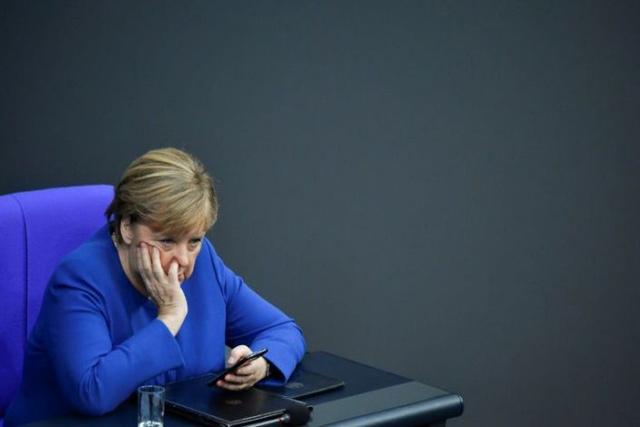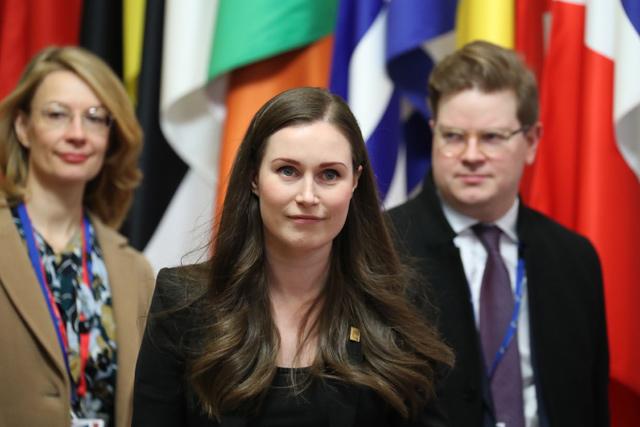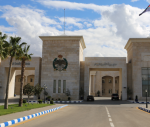You are here
EU leaders to face off in ‘very tough’ budget summit
By AFP - Feb 20,2020 - Last updated at Feb 20,2020

German Chancellor Angela Merkel sees ‘ very tough’ talks over the long-term budget in Brussels, on Thursday (AFP photo)
BRUSSELS — EU leaders gathered on Thursday for a stormy summit to decide the bloc’s seven-year budget, with bitter divisions between parsimonious rich nations, poorer ones wanting to preserve spending and others wanting to fund grand global ambitions.
The tussle for money, hard-fought at the best of times, is especially problematic this time around because of Britain’s departure from the EU.
The “Brexit gap” caused by the loss of the UK’s contribution is 75 billion euros ($81 billion) over the 2021-2027 period.
On the eve of the summit, German Chancellor Angela Merkel had predicted “very tough and difficult negotiations”, with some officials bracing for talks to drag into the weekend.
Summit host Charles Michel, the EU Council president, kicked off the day with one-on-one meetings with leaders of the 27 states starting with Sweden, one of the so-called “frugal four” opposed to big budget increases.
“I am convinced that it will be possible to make progress in the next hours or in the next days,” Michel told reporters.
“The last steps to finding a compromise are always the most difficult, but I think everything is on the table to let us take a decision.”
But not everyone shares Michel’s optimism, with some EU sources suggesting differences are so great the summit could end quickly and the can kicked down the road to another summit — or two — in the coming months.
An analyst at the European Policy Centre, Marta Pilati, agreed, saying: “There likely won’t be agreement at this summit. All the member states aren’t showing much willingness to compromise.”
The minimum spending in the multiannual financial framework (MFF), as the long-term budget is called, is just over 1 trillion euros.
Different goals
The discord is over how much this budget should increase by, how spending might be shifted between priorities and how much each member state should pay as a per centage of its gross domestic product.
Another touchy issue is whether budget rebates pocketed by a few wealthier countries should still exist.
The last MFF came in at 1.08 trillion euros (in 2018 prices).
The “frugal four” — Austria, Denmark, The Netherlands and Sweden — want to rein in the budget and make up only some of the ground of the Brexit gap. They also want to keep their rebates, as does Germany.
Austrian Chancellor Sebastian Kurz struck a tough note on Twitter at the start of the day, insisting Vienna’s budget contributions must not “grow immeasurably” and rejecting a compromise proposed by Michel.
At the high end of spending demands is the European Parliament, which wants the MFF expanded to 1.32 trillion euros to pay for costly goals such as turning the European Union into a carbon-neutral economy within three decades.
The legislature, which has to sign off on the final MFF, believes more money can be raised from EU-wide taxes on plastics and on the carbon emissions trading scheme.
A “friends of cohesion” group of mostly eastern and southern EU nations wants to ringfence money it gets to help bring infrastructure and society up to the level of wealthier counterparts.
Agriculturally sensitive countries such as France, Spain and Poland are also looking to preserve farmers’ subsidies. France would like to also see extra money for common security and defence and the “unfair” rebates scrapped.
The European Commission, which aims for a “geopolitical” mantle under President Ursula von der Leyen, is trying for a target of 1.13 trillion euros
Clinching a deal
Ahead of the summit Michel proposed an MFF of 1.09 trillion euros, making cuts to cohesion funds and farm subsidies to finance other priority areas.
A senior EU official said Michel’s plan would re-allocate “about eight billion euros from richer to poorer member states”.
His plan, though, has little support.
The European Parliament has rejected it as too little. Germany says it is a “step backwards” and Spain has criticised it for “not recognising the role of agriculture” in EU cohesion.
But the senior EU official said Michel believes the splits will not change over the coming months and he “is very determined to clinch a deal in the coming days”.
Related Articles
BRUSSELS — An EU summit called to set the bloc’s next seven-year budget ended in impasse late Friday, riven by competing groups among the 27
BRUSSELS — When Britain leaves the European Union at midnight on Friday the bloc loses the second-biggest net contributor to its budget, lea
BRUSSELS — An EU summit to agree a huge coronavirus economic rescue package was at risk of collapse without a deal on Sunday as bickering le
















